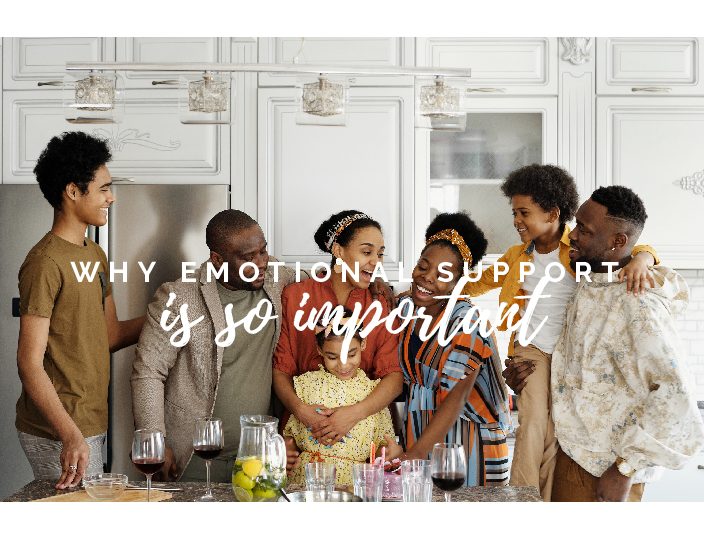Stay at Home Moms: Why Emotional Support is so Important

We have a great family, a good job, a roof over our head, and more than enough food to eat. So what’s missing?
Even though our basic survival needs are being met, we have another vital need that is screaming for attention.
Our need for emotional support.
It’s no secret humans are created to be socially-oriented beings. We thrive by interacting with each other… in person, on a daily basis.
The most significant group we will ever belong to and interact with is our family. Our greatest source of emotional support should be found here.
But somewhere along the way, we’ve forgotten what a family is designed for, and watered down it’s value.
We’ve allowed social media platforms to have a strong presence in our personal lives, and family life. We’ve fallen into the trap that virtual connecting is as good as getting together in person.
But it isn’t.
Marriages are failing, meaningful friendships drift apart, and families don’t spend significant time together anymore. These three emotional bases are crumbling which makes finding healthy emotional support a challenge.
Why do you think dissatisfaction, depression, disease, and suicide are on the rise?
Our emotional deficits have an explanation.
Parents occupy fussy toddlers with videos on their cell phones, and kids grow up thinking it’s normal to have their noses stuck to electronic devices for hours at a time.
We model social media as a priority by the amount of hours we spend on our phones, tablets, and computers. That translates into… monkey-see, monkey-do!
Kids are at great risk of growing up lopsided, because their emotional needs are not being met at home. They are failing in school, facing bullying as an everyday experience, and lured into teenage drug-use as a way to cope with life.
They are not ashamed to tell you, they are just trying to survive. They don’t feel equipped to handle life very well, and are afraid of growing up.
Parents also struggle with keeping their emotional support coming from the right places. Emotional affairs can happen when mates stop connecting enough to keep their marriage relationship vibrant, and someone else starts paying attention to them. Often friendships can replace emotional energy that should be invested in a marriage, when issues are allowed to build up between mates.
Emotional support is built on communication.
If you stop communicating in person, you’ve shut down the main artery for emotional support.
Communicating with each other has evolved into learning new languages and behaviors. The art of conversation has become texting in slang, emojis, and snapshots. It’s no wonder kids don’t feel understood.
Kids expect life to wrap around their needs and wants. They don’t feel the need to engage to help anyone but themselves, and social etiquette has all but disappeared.
Kids fantasize about life more than they create life. They learn more about life online than with their family. They are more comfortable in front of a computer screen, alone in their bedroom, than meeting up with friends.
How will our kids learn to cope in life, if they grow up with emotional support substitutes instead of experiencing the real thing with their family?
How will our kids learn about compassion and encouragement? Or learn good listening skills, develop creative ways to share advice, and understand the significance of investing in each other’s lives?
The answer is simple.
Emotional support is learned just like everything else… through practice.
We start by modeling it right at home.
It doesn’t mean our family dynamic has to be perfect in any way, we just have to be there for each other.
It means we choose activities to do together, that will build relationships, character, life skills, and memories, as a family.
It means we have face to face conversations. It means we spend time together walking and exploring our incredible world. It means we listen, even if it’s inconvenient, or we’re tired.
It means we invest in each other by putting down our electronics and choosing hobbies and projects to work on together. It means cooking together, taking day trips together, and reaching out to someone in need together.
Feeling loved, understood, and emotionally supported, creates confidence, a sense of belonging, and the ability to thrive.
That’s what emotional support is.
If that’s what you’re missing… then the good news is, you’ve got the opportunity to build emotional support right in your hands. And, your kids will appreciate it, too!






